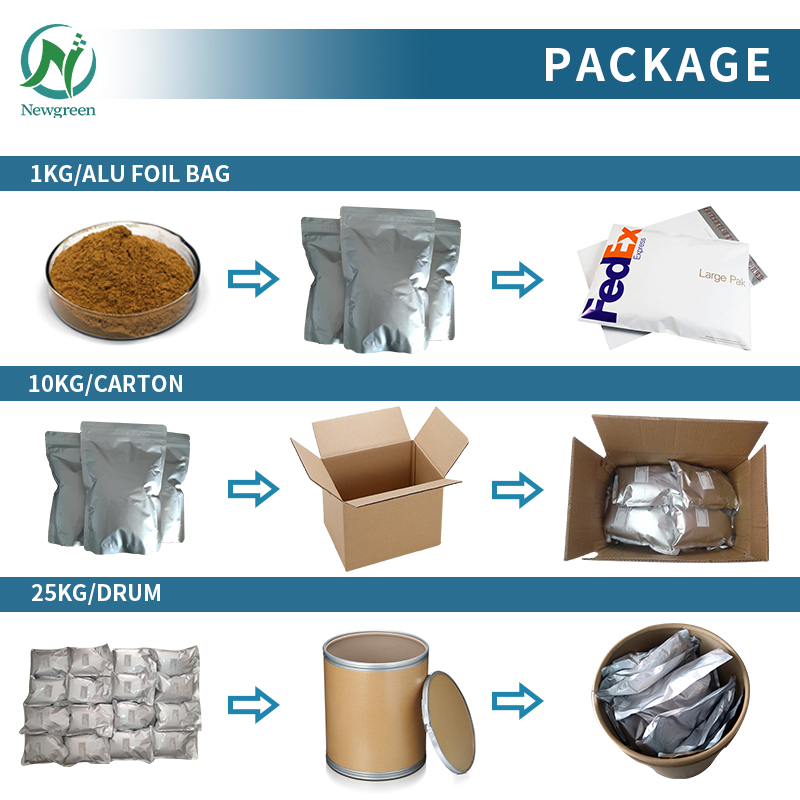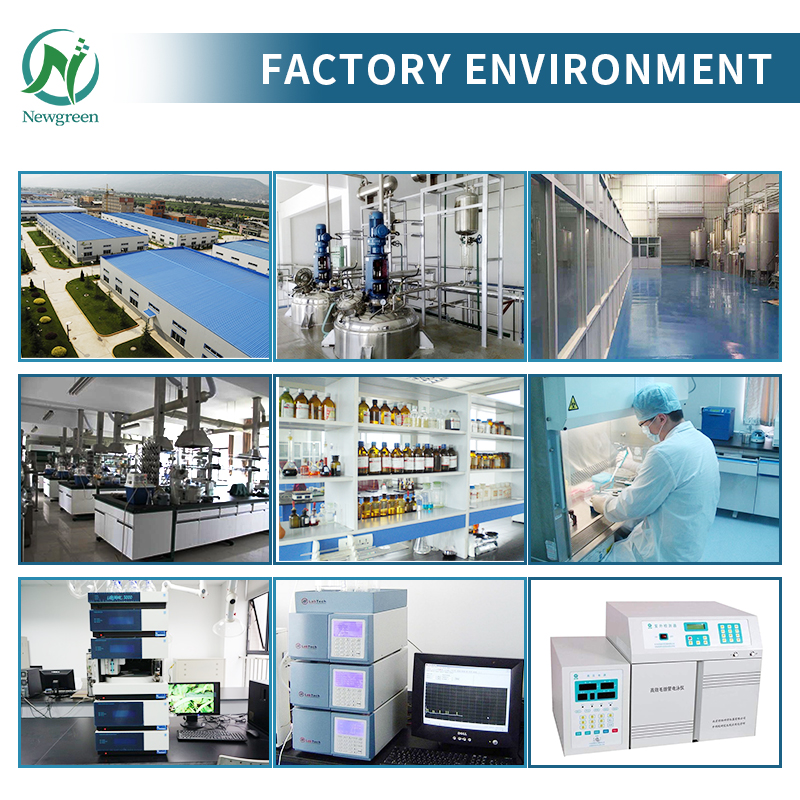Newgreen Factory Supply Extract Food Grade Pure Pycnogenol anthocyanin Powder 98%

Product Description
Pycnogenol is a famous Chinese green tea mainly produced in the Taihu region of Jiangsu Province. Pycnogenol tea is famous for its unique aroma and taste, and is rich in a variety of nutrients, including anthocyanins. Although the anthocyanin content of Pycnogenol tea is relatively low, they still have certain health benefits.
Introduction to Pycnogenol Anthocyanins
1. Source: Pycnogenol tea is made from buds and new leaves. Anthocyanins are mainly found in the epidermis and cells of the tea leaves.
2. Color: Anthocyanins give tea leaves a certain color. Although the main color of Pycnogenol is green, in some cases, the presence of anthocyanins may affect the color of the tea soup.
3. Antioxidant: The anthocyanin in Pycnogenol is a natural antioxidant that can help neutralize free radicals, slow down cell aging, and reduce the damage of oxidative stress to the body.
4. HEALTH BENEFITS: Although Pycnogenol is not as high in anthocyanins as some other plants, such as cranberries or blueberries, it can still provide drinkers with some health benefits, including promoting cardiovascular health, strengthening Immunity and improved digestion.
5. How to drink: Pycnogenol is usually consumed in the form of tea, and its anthocyanin nutritional content can be retained when brewed.
In short, although the content of Pycnogenol anthocyanins may not be as high as that of some other fruits and plants, it is still one of the important nutrients in Pycnogenol tea and has certain health benefits.
COA
| Item | Specification | Result | Method |
| Maker Compounds | Pycnogenolanthocyanin ≥98% | 98.42% | UV (CP2010) |
| Organoleptic | |||
| Appearance | Amorphous powder | Conforms | Visual |
| Color | Purplered | Conforms | Visual |
| Part Used | Fruit | Conforms | |
| Extract Solvent | Ethanol & Water | Conforms | |
| Physical Characteristics | |||
| Particle Size | NLT100%Through80 | Conforms | |
| Loss on Drying | 三5.0% | 4.85% | CP2010Appendix IX G |
| Ash content | 三5.0% | 3.82% | CP2010Appendix IX K |
| Bulk Density | 4060g/100ml | 50 g/100ml | |
| Heavy metals | |||
| Total Heavy Metals | ≤10ppm | Conforms | Atomic Absorption |
| Pb | ≤2ppm | Conforms | Atomic Absorption |
| As | ≤1ppm | Conforms | Atomic Absorption |
| Hg | ≤2ppm | Conforms | Atomic Absorption |
| pesticide residue | ≤10ppm | Conforms | Atomic Absorption |
| Microbiological Tests | |||
| Total Plate Count | ≤1000cfu/g | Conforms | AOAC |
| Total Yeast & Mold | ≤100cfu/g | Conforms | AOAC |
| E.Coli | Negative | Negative | AOAC |
| Salmonella | Negative | Negative | AOAC |
| Staphylococcus | Negative | Negative | AOAC |
| Expiration Date | 2 Years When Stored properly | ||
| Total Heavy Metals | ≤10ppm | ||
| Packing and Storage | Inside: doubledeck plastic bag,outside:Neutral cardboard barrel& Leave in the shady and cool dry place. | ||
Function
Pycnogenol is a famous Chinese green tea mainly produced in the Taihu region of Jiangsu Province. Pycnogenol tea contains a variety of biologically active ingredients, including anthocyanins. Although the main components of Pycnogenol tea are tea polyphenols and caffeine, its anthocyanins also have certain functions and health benefits. The following are the main functions of Pycnogenol anthocyanins:
1. Antioxidant effect
Pycnogenol anthocyanins are a powerful antioxidant that can neutralize free radicals in the body, slow down cell aging, and reduce the damage of oxidative stress to the body.
2. Promote cardiovascular health
Anthocyanins help improve blood vessel function and lower cholesterol levels, which may reduce the risk of heart disease and stroke.
3. Antiinflammatory effect
The anthocyanins in Pycnogenol have antiinflammatory properties that may help reduce chronic inflammation and reduce the risk of inflammationrelated diseases.
4. Improve vision
Anthocyanins are thought to have protective effects on the eyes and may help improve vision and prevent eye disease.
5. Promote immunity
The antioxidant and antiinflammatory properties of anthocyanins may help enhance immune system function and improve the body's resistance.
6. Possible anticancer effects
Some studies suggest that anthocyanins may have anticancer properties and can inhibit the growth of certain cancer cells.
7. Improve skin health
The antioxidant properties of anthocyanins may help protect the skin from UV damage and slow down skin aging.
In short, Pycnogenol anthocyanins have a variety of health benefits, and moderate intake can provide multifaceted support to the body. Combined with other healthy diet and lifestyle options, Pycnogenol and its anthocyanins may help improve overall health.
Application
Although the content of anthocyanins in Pycnogenol tea is relatively low, it still has certain application value. The following are the main application areas of Pycnogenol anthocyanins:
1. Food and Beverages
Tea Drinks: As a highquality green tea, Pycnogenol is popular for its unique aroma and taste. Although the anthocyanin content is not as high as some other teas, its antioxidant properties make it a healthy beverage choice.
Functional Drinks: Some beverage manufacturers may combine Pycnogenol with other ingredients to create functional drinks that emphasize its antioxidant and health benefits.
2. Health products
Nutritional Supplements: Although Pycnogenol has a low anthocyanin content, its extract may be used in health supplements as an antioxidant and healthpromoting ingredient.
3. Cosmetics
Skin care products: Due to the antioxidant properties of anthocyanins, Pycnogenol extract may be added to skin care products to help protect against skin aging and environmental damage.
4. Research and Development
Scientific Research: The anthocyanins in Pycnogenol and its health benefits are the subject of many studies, driving scientific exploration and new product development in related fields.
5. Traditional culture
Food Culture: As a traditional Chinese tea, Pycnogenol is often used for daily drinking and entertaining guests, and has cultural and social value.
6. Food industry
Natural Pigments: Although the main color of Pycnogenol is green, in some cases, the presence of anthocyanins may affect the color of the tea soup and is used as a natural pigment.
In short, the application of Pycnogenol anthocyanins is mainly concentrated in the fields of food, health products and cosmetics. As people pay more attention to health and natural ingredients, the application prospects of Pycnogenol and its anthocyanins are still broad.
Related products

Package & Delivery



















